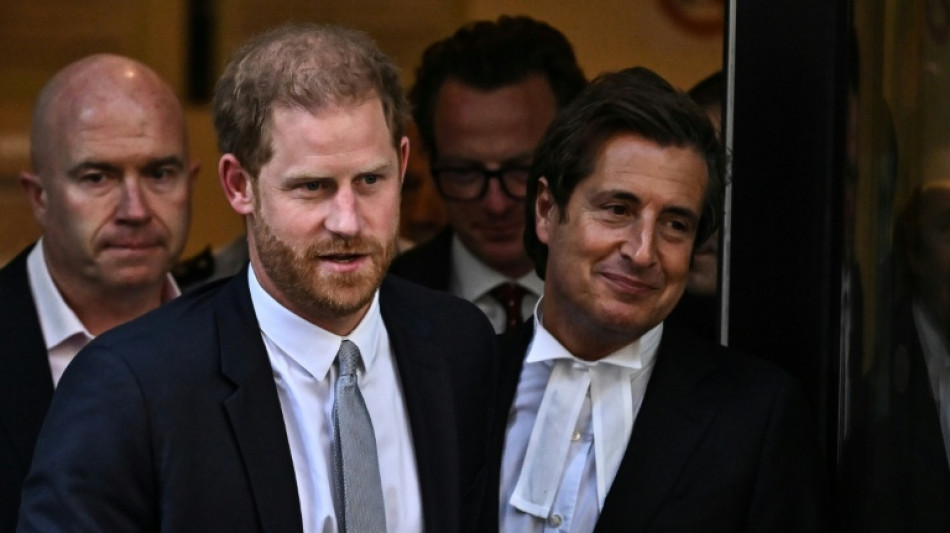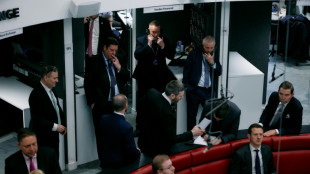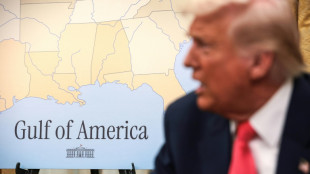

Prince Harry trial against Murdoch UK tabloids delayed
The start of a long-awaited trial initiated by Britain's Prince Harry against a tabloid publisher for allegedly unlawful information gathering stalled Tuesday as lawyers held last-minute "discussions".
The High Court judge hearing the long-running case twice agreed to pause Tuesday's proceedings, eventually for the entire morning, at the request of Harry's lawyers, who said they were engaged in unspecified talks.
The delay prompted unsubstantiated reports from journalists covering the case that the two sides were discussing a new settlement offer to avoid a trial.
AFP has asked the prince's lawyers for comment, but could not immediately verify the reports.
The case, the culmination of years of legal wrangling, pits King Charles III's youngest son against Rupert Murdoch's News Group Newspapers (NGN).
NGN lawyers agreed to the request to delay the start of the trial on Tuesday.
Harry claims that private investigators working for two tabloids owned by NGN -- The Sun and now-shuttered News of the World -- repeatedly targeted him unlawfully more than a decade ago.
It is one of several lawsuits the 40-year-old has brought against UK newspaper publishers, with whom he has long had a fractious relationship.
He has blamed the paparazzi for the 1997 death of his mother, Princess Diana, in a car chase in Paris.
The California-based royal won a phone hacking case against Mirror Group Newspapers (MGN) just over a year ago.
However, the High Court claim against NGN does not encompass phone hacking allegations, after judge Timothy Fancourt previously ruled the prince had run out of legal time to pursue that claim.
The only other remaining claimant in the case is Tom Watson, a former deputy leader of the Labour party who now sits in the House of Lords.
- Cover-up claims -
Both Harry and Watson say that NGN's private investigators of using unlawful newsgathering techniques to generate stories about them, and that company executives deliberately covered up their practices by deleting emails.
Watson also alleges his phone was hacked between 2009 and 2011, when he was investigating Murdoch's tabloids as an MP on a watchdog committee.
NGN denies the allegations, calling the cover-up claim "wrong" and "unsustainable".
An hour after the trial was set to begin in a fifth-floor London courtroom packed with reporters, the pair's star lawyer David Sherborne requested "a further period of time to continue discussions".
Fancourt reluctantly agreed, ordering both sides to return at 2:00 pm (1400 GMT).
The trial is set to last up to 10 weeks.
Harry, who quit as a working royal in 2020 and settled in the United States with his wife Meghan, is due to give evidence to back up his claims against the tabloids covering a 15-year period from 1996.
He was not present Tuesday, while Watson arrived mid-morning.
The prince, whose formal title is the Duke of Sussex, became the first senior British royal to give evidence in court in a century when he testified against MGN in 2023.
Fancourt, who also presided over that case, ruled in the prince's favour, concluding that phone hacking had been "widespread and habitual" at MGN titles in the late 1990s and that the duke's phone had been tapped to a "modest extent".
- 'Accountability' -
Widespread phone hacking allegations against a number of British tabloids emerged in the late 2000s, prompting the launch of a public inquiry into UK press culture.
NGN apologised at the time for unlawful practices at the News of the World and closed it in 2011, while denying similar claims against The Sun and suggestions of a corporate cover-up.
It has since settled cases brought by around 1,300 claimants.
The publisher has paid out around £1 billion ($1.2 billion) including legal costs, according to British media, and had never seen a case go to trial.
That has prompted criticism that England's civil litigation system favours deep-pocketed defendants who leave claimants with little choice but to settle.
Various high-profile figures who made claims against NGN, including Harry's brother and heir-to-the-throne Prince William and actor Hugh Grant, have settled in recent years.
Grant, a long-time critic of Britain's tabloids, revealed last year that he had opted against a trial because it could land him with costs approaching £10 million even if he won.
Under litigation rules, if a claimant refuses a settlement and a judge awards a lower sum after a trial, the claimant must pay both sides' legal costs.
Harry has shown no sign of wanting to settle in a legal battle that Fancourt said in an October ruling "at times resembles more an entrenched front in a campaign between two obdurate but well-resourced armies".
The British royal told a New York Times event last month that his goal was "accountability".
J.K.Gengler--LiLuX

